Diplomatic Bluebook 2023
Chapter 4
Japan's Diplomacy Open to the Public
2 Japanese Continuing Working in the International Community
(1) Japanese Continuing Working in International Organizations
International organizations are founded to serve the common interest of the international community. People of various nationalities join these international organizations, and draw on their skills and traits to create an environment where people of the world can live in peace and enjoy prosperity. There are many international organizations working to solve global issues that cannot be addressed by individual countries, including Russia's aggression against Ukraine, the global pandemic of COVID-19, the environment, climate change, sustainable development, disarmament/non-proliferation, conflict prevention/peacebuilding, food, energy, disaster prevention, education, labor, human rights/humanitarian issues, and gender equality.
Talented individuals with specialized knowledge, passion and capabilities to contribute to the world's interests are needed so that international organizations can competently perform their duties and fulfill the roles expected of them. As a member country of these international organizations, Japan, in addition to policy contributions, makes assessed and voluntary contributions. Furthermore, it can be said that the activities and services of Japanese staff are, in a broad sense, also Japan's contributions. Additionally, a larger number of talented Japanese people continuing working in international organizations will further enhance Japan's presence in the international community more visibly. Japanese staff are involved in various fields and duties at different locations, but they share the same goal of solving various issues facing the international community (see the Columns on pages 339 and 340). Moreover, encouraging the employment of more Japanese nationals who can continue working on the international stage with professional experience at international organizations will in turn lead to enrichment of Japan's human resources, contributing to the development of Japan as a whole.
Currently, Japanese nationals are serving in important posts at international organizations that include the United Nations (UN). Japanese nationals are actively performing leadership roles at organizations such as the Universal Postal Union (UPU), a specialized agency of the UN that Mr. METOKI Masahiko assumed leadership of in January 2022, the World Customs Organization (WCO), and the Asian Development Bank (ADB). In addition, for many years Japan has sent a succession of Japanese judges to international courts such as the International Court of Justice (ICJ), the International Tribunal for the Law of the Sea (ITLOS) and the International Criminal Court (ICC). In light of the importance of international organizations for addressing global challenges, securing the top and other important posts that contribute to strengthening ties between Japan and international organizations, including as the heads of international organizations, is an important challenge. On the other hand, the top and other important posts of international organizations, are not something that can be secured overnight. It is necessary to make a finely-tuned response by adopting a long-term perspective while cultivating suitable personnel.
Currently, 956 Japanese nationals (as of the end of 2021; figures gathered by MOFA) are working as professional-level or higher-level staff in UN-related agencies around the world, which is a record figure. With the aim of further increasing such Japanese personnel, the Government of Japan has set a target of 1,000 Japanese working for UN-related agencies by 2025. To this end, in collaboration with universities, related ministries and agencies, and organizations, MOFA is actively recruiting, training and supporting Japanese nationals who can continue working in the international organizations and make a contribution on the global stage. As part of this effort, MOFA runs the Junior Professional Officer (JPO) Programme, which sends young Japanese nationals to positions in international organizations for a term of two years in principle, with the aim of gaining regular staff positions in such organizations after the term. MOFA also runs a program to support the advancement of Japanese nationals who can be future managerial candidates by offering them mid-career and higher professional experience. In addition to encouraging the employment of more Japanese nationals through these efforts, MOFA is also working to coordinate with international organizations and gather information for the employment and promotion of Japanese staff.
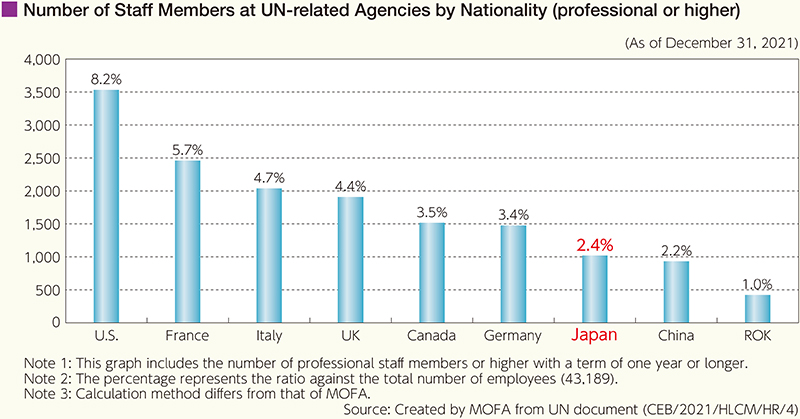
For Japanese nationals who wish to work for international organizations, the MOFA Recruitment Center for International Organizations continually provides useful information of vacancy announcements at international organizations on its official website, and through mailing lists, social media such as Facebook, Twitter and LinkedIn, and video sharing platforms such as YouTube. In addition, the MOFA Recruitment Center for International Organizations works on publicity to provide online career seminars explaining the attractiveness of working at international organizations and methods to apply for a job, and also online explanatory sessions with invited senior Japanese staff working for international organizations and human resource specialists from international organizations.
MOFA will continue to encourage the employment of more Japanese nationals working in international organizations and support their promotion, so that a larger number of competent Japanese nationals who have high aspirations and passion to contribute to solving global issues can take part in international organizations.
(2) Activities of Non-Governmental Organizations (NGOs)
A Development Cooperation
NGOs can play significant role in development cooperation and humanitarian assistance as players that provide support to various nations, including developing countries. MOFA supports these NGOs' efforts in light of conducting comprehensive diplomacy through leveraging the capabilities of organizations other than the Government.
Through NGOs, MOFA actively provides Official Development Assistance (ODA) via financial cooperation in the form of grant assistance (Grant Assistance for Japanese NGO Projects) for economic and social development projects implemented by Japanese NGOs in developing countries and regions. The projects cover a wide range of assistance, including health, medical and hygienic care, rural development, and support for people with disabilities, education, disaster risk reduction, and the clearance of landmines and unexploded ordnances (UXO). In FY2021, MOFA provided funding for 96 projects to Japanese NGOs (51 organizations) implementing Grant Assistance for Japanese NGO Projects in 35 countries and one region, including Asia, Africa, the Middle East, and Latin America and the Caribbean (see the Special Feature on page 343). Moreover, the NGO Project Subsidies are provided to improve the project execution capabilities and expertise of NGOs and to support activities that contribute to the promotion of NGO projects.
Additionally, Japan Platform (JPF) was established in 2000 with the aim of conducting emergency humanitarian assistance more effectively and promptly through cooperation and partnerships among the Government, NGOs, and business communities at the time of large-scale natural disasters or conflicts. As of the end of December 2022, 45 NGOs are members of JPF. In 2022, JPF implemented response programs for the humanitarian crisis in Ukraine (support for displaced persons in Ukraine and nearby countries) and for the food crisis resulting from the impact of rising food, fuel, and feed prices, etc., due to the situation over Ukraine. It also implemented a support program for the humanitarian crisis in Myanmar (support for displaced persons in Myanmar), an earthquake victim support program in eastern Afghanistan, and a flood victim support program in Pakistan, as well as support for refugees and internally displaced persons in Bangladesh, Ethiopia, Mozambique, South Sudan and neighboring countries, Uganda, Yemen, Venezuela, Afghanistan, Palestine, Iraq, and Syria.
In this way, NGOs assume important roles in the area of development cooperation and humanitarian assistance. Identifying such NGOs as partners in international cooperation, MOFA and the Japan International Cooperation Agency (JICA) provide indirect support for NGO activities through various policy measures aimed at enhancing their capability and expertise as well as developing human resources so that NGOs can strengthen the foundation for their activities and perform further tasks. In 2022, MOFA implemented four programs – namely, the “NGO Consultant Scheme,” “NGO Study Program,” “NGO Intern Program” and “NGO Study Group.”
The plenary meeting of the NGO-MOFA Regular Consultation Meeting, the purpose of which is to promote dialogue and coordination between NGOs and MOFA, was held in November. Meetings of the ODA Policy Council, where opinions are exchanged on general ODA policies, were held online in March, July and November, while meetings of the Partnership Promotion Committee to discuss support and cooperation measures for NGOs were also held online in January, July, and December. Furthermore, an extraordinary plenary session was held in September regarding revisions to the Development Cooperation Charter. In addition, based on the understanding that multi-stakeholder partnerships and engagement is indispensable to achieve the Sustainable Development Goals (SDGs), MOFA has been exchanging views with various stakeholders, including NGOs, at the “SDGs Promotion Roundtable Meeting” established in September, 2016.
Russia's invasion of Ukraine, which began in February 2022, has become a major challenge to the international order based on the UN Charter. The impact of the invasion has extended beyond the boundaries of Ukraine's neighborhood, creating ripple effects that have been felt by developing countries through a three-pronged global crisis of food, energy, and finance. Today, we are experiencing a period of increased turbulence in which multiple crises are simultaneously escalating across the globe. These include growing tensions between major powers that may exacerbate global instability and further divisions, the proliferation of conflicts and military coups d'états, the global backlash against human rights, the increasingly intensifying impact of the climate crisis, deepening disparities and inequalities, which NGO Oxfam International defines as “economic violence,” and sweeping technological advancements that regulatory frameworks have not been able to keep up with.
Disarmament affairs, which I oversee at the UN, is an area closely linked to security. Today, in the field of disarmament, it is becoming difficult to see the kind of progress we have experienced in the post-Cold War era, especially in the face of heightened international tensions.
The challenges in the field of disarmament are manifold. These range from the elimination of weapons of mass destruction - such as nuclear, chemical, and biological weapons - that threaten the very survival of humankind, the restriction and effective control of conventional weapons such as small arms and light weapons, which are the main cause of casualties in most conflicts, and efforts to ensure and preserve peace in new domains of human activity such as outer space and cyberspace. These are coupled with new challenges such as preventing the adverse security risks emanating from artificial intelligence and all types of emerging technology. Emerging technologies might fundamentally change the landscape of war and conflict in ways we cannot even imagine, just as nuclear weapons did. To respond to these challenges, multilateral normative efforts at the UN have become more acute and critical than ever.
Against this constantly evolving backdrop, our role at the UN Office for Disarmament Affairs is to support discussions and negotiations among Member States. We identify new issues and challenges, analyze them, and propose a range of possible options to address them based on substantive expertise. In multilateral discussions, we provide support and advice to the Chairpersons and Member States and help broker compromises between the diverging views of Member States as needed. We maintain close dialogue with all Member States, work to understand their various positions, and support efforts to find common ground between them. Once consensus has been formed, we provide support to Member States so that they are able to implement the agreement in their national contexts. A lot of hard work goes on behind the scenes, day and night.
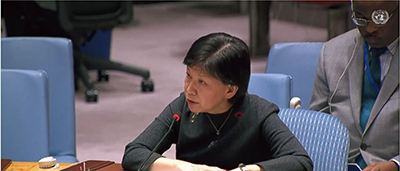 The author briefing the UN Security Council under the agenda item “threats to international peace and security.” (December, New York, the U.S. Photo: UN Office for Disarmament Affairs)
The author briefing the UN Security Council under the agenda item “threats to international peace and security.” (December, New York, the U.S. Photo: UN Office for Disarmament Affairs)Is disarmament even possible in today's deteriorating international security environment? I will give you an example: the Review Conference of the Parties to the Treaty on the Non-Proliferation of Nuclear Weapons (NPT) held in August 2022 failed to adopt a final outcome document. However, this was due to opposition from one country. Even in today's difficult environment, all state parties seriously engaged in discussions relating to nuclear disarmament, non-proliferation, and peaceful uses of nuclear energy during the Review Conference. I believe the fact that we were so close to consensus demonstrates the shared understanding that multilateral disarmament negotiations continue to have a strong value. Indeed, disarmament and arms control negotiations are not at all idealistic notions, but practical and realistic instruments for security. Indeed, the 9th Review Conference of the Biological Weapons Convention held in December 2022 adopted its final document by consensus after tough negotiations, despite the global security context. The steps agreed to strengthen the Convention were the most important ones taken in the last 20 years.
In September 2021, UN Secretary-General Guterres launched his vision for our collective future on the globe in his “Our Common Agenda.” As part of the follow-up work envisaged in this document, my office together with other entities of the UN's peace and security pillar, have developed the Secretary-General's report on the “New Agenda for Peace.” This New Agenda has a strong focus on disarmament issues and creates entry points for a new vision for disarmament mentioned in “Our Common Agenda.”
I recall the famous words of former Secretary-General of the UN, Dag Hammarskjöld, someone I very much respect, who said “the UN was not created to take mankind to heaven, but rather to save humanity from hell.” In these turbulent times we are going through, I strongly believe that the efforts of the UN are needed more than ever to bring us to a safer future.
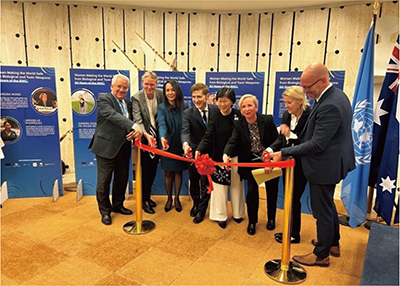 Opening of the photo exhibition “Women Making the World Safe from Biological and Toxin Weapons: 50 Years of the BWC” (the author is the fourth from the right) (November, Geneva, Switzerland. Photo: UN Office for Disarmament Affairs)
Opening of the photo exhibition “Women Making the World Safe from Biological and Toxin Weapons: 50 Years of the BWC” (the author is the fourth from the right) (November, Geneva, Switzerland. Photo: UN Office for Disarmament Affairs)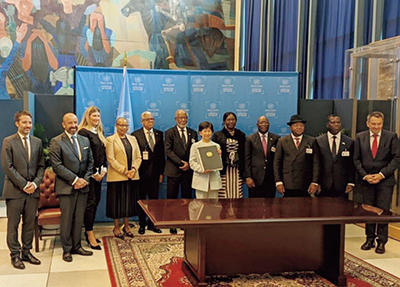 The signature and ratification ceremony for the Treaty on the Prohibition of Nuclear Weapons (the author is in the center) (September, New York, the U.S. Photo: UN Office for Disarmament Affairs)
The signature and ratification ceremony for the Treaty on the Prohibition of Nuclear Weapons (the author is in the center) (September, New York, the U.S. Photo: UN Office for Disarmament Affairs) The author in the ICAO Headquarters Council Chamber. After working in the Civil Aviation Bureau at the Ministry of Land, Infrastructure, Transport and Tourism, he has been working at the ICAO Secretariat since 2008, and has been in his current position since 2015.
The author in the ICAO Headquarters Council Chamber. After working in the Civil Aviation Bureau at the Ministry of Land, Infrastructure, Transport and Tourism, he has been working at the ICAO Secretariat since 2008, and has been in his current position since 2015.The International Civil Aviation Organization (ICAO, headquarters: Montreal, Canada) formulates a variety of international rules for the orderly development of international aviation, and consensus documents are developed by government representatives from 193 Member States (Contracting States to the Chicago Convention), including Japan, through discussions on these rules at various levels, from high-level ministerial meetings to expert-level committees and working groups. International rules agreed upon at ICAO are then implemented based on the domestic laws and regulations of each Member State (such as Japan's Civil Aeronautics Act).
Compared to the field of aviation safety and other fields, the environmental protection that I am in charge of, and particularly the topic of climate change, is a relatively new field within ICAO, and when I joined the ICAO Secretariat in 2008 my work was like painting on a blank canvas. There were no CO2 reduction goals for international aviation, almost no CO2 reduction measures being developed, and no implementation support, or follow-up mechanisms. Thereafter, continuous progress has been made at the ICAO Assembly held every three years; in 2010 an agreement was reached on a medium-term CO2 reduction goal and the development of State Action Plans for the international aviation sector; in 2013 an agreement was reached to develop a global market mechanism to achieve the medium-term goal in 2016 a historic agreement was reached on the specific Carbon Off setting and Reduction Scheme for International Aviation (CORSIA) system; in 2019 an agreement was reached to explore the feasibility of a long-term sectoral goal and in 2022, the most recent ICAO Assembly, an agreement was reached on “Net-Zero 2050” as a long-term global aspirational goal for international aviation.
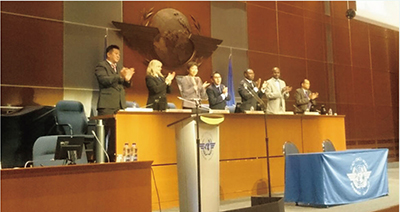
 Standing ovation when the CORSIA was agreed to at the ICAO Assembly in 2016
Standing ovation when the CORSIA was agreed to at the ICAO Assembly in 2016In climate change discussion under ICAO, there are two major reasons that make it difficult to reach a consensus on international rules. The first is how to achieve the competing goals of reducing emissions, which are the primary focus of climate change measures, without impeding the orderly growth of aviation. The second is how to integrate the principle of the historical responsibility of developed countries for climate change, which is included in the so-called Kyoto Protocol and Paris Agreement, with ICAO's principle of non-discriminatory treatment of countries in the international aviation sector, where the emissions themselves are transnational, without causing market distortions.
Over the above two issues, the positions of the governments of the ICAO's 193 Member States are always sharply divided. It is not just a simple dichotomy between developed and developing countries. It is not true that the so-called developed countries are all lined up behind the same position. For example, the position between European countries, which are environmentally advanced, and the rest of the developed world sometimes differ completely. On top of this, some developing countries show a more active position in reducing emissions and in consensus building at ICAO than some developed countries.
As the ICAO Secretariat and as the “facilitator” for these discussions, the most difficult, and conversely, the most exciting aspect of my role is to listen to such diversified positions of the various countries while supporting the Chairperson of meetings/conferences in moving the discussions forward. When the positions between countries are far apart then the Secretariat sometimes provides a middle position proposal that is difficult for any country to propose directly, and then, we have to promote discussions and update the proposal as the discussions progress, in order to increase the support base and eventually secure a large majority support toward an agreement by all. Additionally, we need to prepare a variety of scenarios in advance in order to create this kind of discussion flow in a proactive manner.
Going forward, from the beginning of 2023, discussions intensify toward achieving the long-term goal of “Net-Zero 2050” for the international aviation sector, a goal that was agreed upon at the recent ICAO Assembly. The ICAO Secretariat cannot make any decisions by itself, but it facilitates discussions and can offer proposals to help reach final decisions by the Member States. This is also a job that requires a sense of calm and foresight to know each country's position and how far forward a compromise can be agreed upon. I believe that the ICAO Secretariat has a significant role to play in making substantial progress toward addressing climate change issues in international aviation at ICAO, and that ICAO will ultimately be recognized by the world as an organization that continues to lead the way on this issue.
B Partnership in Other Major Diplomatic Areas
The Government of Japan holds dialogues with civil society including NGO representatives and experts on matters related to government reports to be submitted based on various human rights treaties, as well as on implementation of the National Action Plan on Business and Human Rights, the National Action Plan to End Violence Against Children and the National Action Plan on Women, Peace and Security, which is based on the UN Security Council (UNSC) resolution 1325 and related resolutions.
In the area of conventional weapons, MOFA works in cooperation with NGOs in implementing clearance of mines and UXOs, and mine risk education projects, in countries affected by mines and UXOs.
Furthermore, in the area of nuclear disarmament, MOFA has been conducting dialogues with various NGOs and experts. The Government supports the activities of NGOs and others to convey the realities of nuclear weapons use to the international community, through the commissioned projects known as the “Special Communicator for a World without Nuclear Weapons” and the “Youth Communicator for a World without Nuclear Weapons.” As of December 2022, a total of 302 Special Communicators on 102 occasions and a total of 569 Youth Communicators on 42 occasions have been dispatched to the world through these commission programs.
With regard to countermeasures to combat transnational organized crime, coordination with civil society, such as NGOs, is essential, especially in the field of trafficking in persons. In this respect, the Government actively exchanges opinions with NGOs and other stakeholders to identify recent trends of trafficking in persons and to examine effective measures to address this crime.
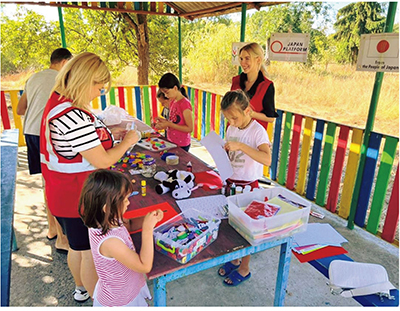 Psychological first aid for refugees in three regions in Western Ukraine (photo: IVY and its associate organization STEP-IN)
Psychological first aid for refugees in three regions in Western Ukraine (photo: IVY and its associate organization STEP-IN)(3) Japan Overseas Cooperation Volunteers, Experts and Others
The Japan Overseas Cooperation Volunteers (JOCV, JICA Volunteer Program) is a JICA program aimed at providing cooperation and assistance for the socio-economic development of the communities of developing countries. In the program, Japanese nationals from 20 to 69 years of age with skills, knowledge, and experience live and work together with local people in these countries while fostering mutual understanding with these people. As of the end of March 2022, 54,772 JOCVs have been dispatched to 98 countries in total since the program's launch in 1965. The dispatched volunteers have been engaged in about 190 types of work in nine sectors: planning/administration, commerce/tourism, public utility works, human resources, agriculture/forestry/fishery, health/medical care, mining, social welfare, and energy.
Ex-volunteers have been contributing to Japanese society through initiatives such as sharing their experiences in educational, regional and business activities. These unique participatory initiatives by Japan have been highly appreciated and expected both within and outside of Japan, including recipient countries.
Although dispatches of JOCVs had been temporarily suspended due to the spread of COVID-19, since November 2020, JOCVs have been dispatched once again, to the countries where the conditions for dispatch had been met, taking into account the COVID-19 situation and other factors (see the Column on page 345).
JICA experts with specialized knowledge, insights, skills, and experience are dispatched to governmental agencies and other sites in developing countries. The experts provide high-level policy advice and transfer necessary skills and knowledge to government officials and engineers of the partner countries. Furthermore, they work together with their counterparts to develop, promote and disseminate technologies and systems that are suitable to each country's context. These experts actively engage in a wide range of sectors, including those addressing basic human needs such as health/medical care and water/sanitation, and those of socio-economic development such as legal system development and formulation of urban planning. They contribute to the social and economic development of developing countries and to fostering mutual trust between Japan and developing countries through their activities.
A total of 2,583 experts were newly dispatched to 95 countries and regions in FY2021, showing a recovery trend from the impact of the global spread of COVID-19. Experts who are on standby in Japan due to the difficulties in traveling to their destination are carrying out their duties remotely while staying in touch with their counterparts.
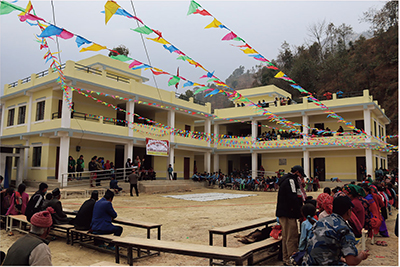 Opening ceremony of a school in Nepal (Photo: Shanti Volunteer Association)
Opening ceremony of a school in Nepal (Photo: Shanti Volunteer Association)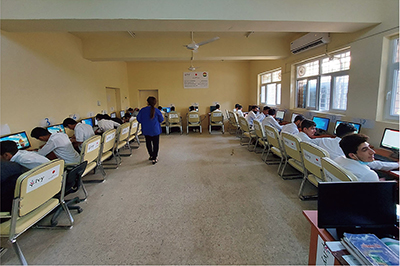 Students studying in a PC classroom in Iraq (Photo: IVY)
Students studying in a PC classroom in Iraq (Photo: IVY)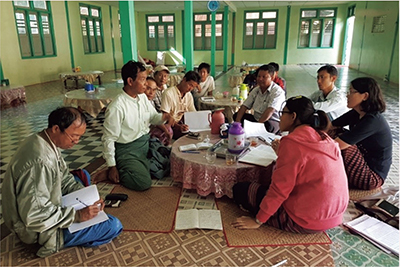 Maintenance committee discussing infrastructure that was constructed in a Myanmar project (Photo: Terra People Association)
Maintenance committee discussing infrastructure that was constructed in a Myanmar project (Photo: Terra People Association)Grant Assistance for Japanese NGO Projects was established in 2002 by consolidating Japanese NGO programs and other programs within the Grant Assistance for Grassroots Projects (currently “Grant Assistance For Grassroots Human Security Projects”). In 2022, this program is celebrating its 20th anniversary. Through this framework, the Ministry of Foreign Affairs (MOFA) provides Official Development Assistance (ODA) to Japanese NGOs for economic and social development projects in developing countries and regions. With the goal of “leave no one behind,” Japanese NGOs are effectively reaching the most vulnerable people, such as the poor, women, the elderly, refugees, and internally displaced persons, who are difficult to reach through assistance from governments and international organizations alone. NGO support activities are closely related to local communities in each developing country, and are able to respond in detail to the support needs of the local population, thereby making it possible to provide assistance at the grassroots level, a true example of “visible development cooperation.”
From FY2002 to FY2021, a total of approximately 61.9 billion yen has been provided to 74 countries and 1 region. The projects cover a wide range of areas, including education, agriculture and forestry, medicine and health, disaster risk reduction, water and hygiene, and the clearance of landmines and unexploded ordnances. In FY2021, approximately 5.7 billion yen in funding assistance was provided for 96 projects. The amount of funding provided has increased approximately 10-fold since program began in FY2002.
MOFA will continue to support NGO activities and will further strengthen its cooperation with NGOs, which are “important partners to the government in development cooperation,” and utilize their knowledge to achieve more effective and efficient ODA.
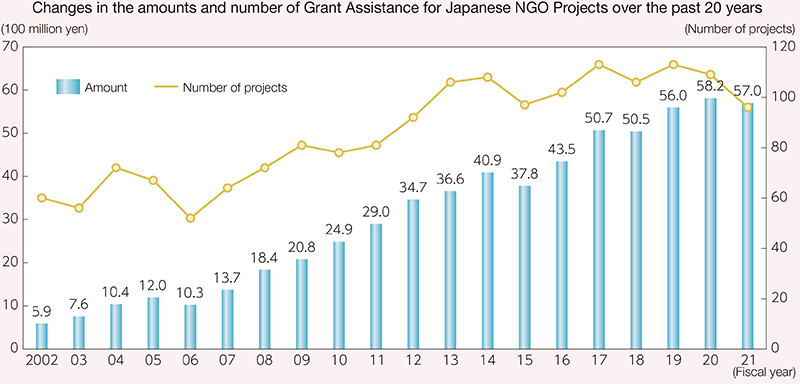
I started judo when I was four years old, but a major turning point came when I was at university. I participated in an overseas training program in judo and was impressed by the foreign children's attitude toward learning and their fearlessness. Later, when I became a working adult, I wanted to do something to give back through judo after practicing it for so many years, so I applied for the Japan Overseas Cooperation Volunteer program. The spread of COVID-19 delayed my dispatch for about a year, but I was finally able to land in Madagascar in December 2021.
Currently I promote judo and coach the national team as a member of the Malagasy Judo Federation. When I was first dispatched to Madagascar, I was shocked to see that there were no tatami mats in the judo dojo (hall used for martial arts training) and that the judoka (judo players) practiced in torn judo uniforms, which was different from the environment in Japan. However, upon closer observation, I was delighted to see the judoka “bowing as they entered and left the dojo,” which is judo etiquette in Japan. At the same time, I was also moved by the fact that judo, which was established by the master KANO Jigoro, has infiltrated so far into Madagascar, a country far away from Japan. This gave me the strength to continue my activities in this country.
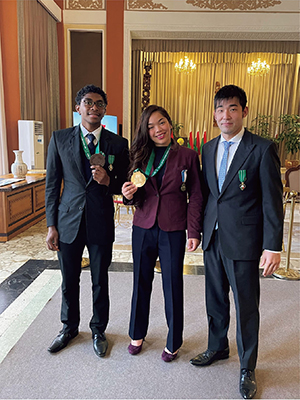 Receiving the medal from the President of Madagascar with the judoka (the author is on the right)
Receiving the medal from the President of Madagascar with the judoka (the author is on the right)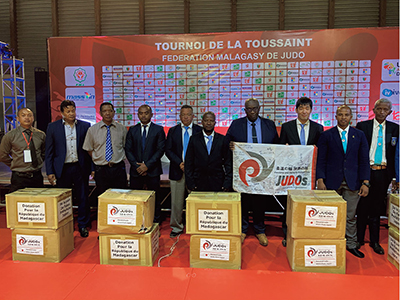 Ceremony to present Judo uniforms donated by Fukui Prefecture and the NPO JUDOs (the author is third from the right)
Ceremony to present Judo uniforms donated by Fukui Prefecture and the NPO JUDOs (the author is third from the right)After five months had passed since my dispatch to Madagascar and I was gradually getting used to living in the country I was dispatched to, I received a request from my organization to coach the national team that would compete in the African Judo Championships. I accompanied the team to a training camp for about a month, and four athletes from the team competed in the finals held in Algeria. Although they did not win a prize, all of them were able to win their first round in an international tournament where they had often lost the first round in the past. It was decided that I would continue coaching them for the next competition, too. As a result of the appreciation for my coaching, the Federation asked me to accompany two judoka as a coach to the African Junior Championships Individuals held in Kenya in July. At this competition, I helped one judoka place third in the men's 73 kg weight class, and the other place first in the women's 70 kg weight class.
Thanks to the splendid results at the international competition, the judoka and I were awarded the Medal of Sports Merit by the President of Madagascar. At this moment I realized that I was not wrong in my coaching methods, and at the same time, I was proud of the Madagascan athletes who practice in a tough environment and are active in international competitions.
In the future, I plan to coach the national team with the goal of competing in the Olympic and Paralympic Games Paris 2024. I also plan to promote judo in the hope that young people in Madagascar will learn the decorum of judo and be brought up to be people who are considerate of others.
Additionally, I would like to contribute to Japan's international cooperation through judo.




